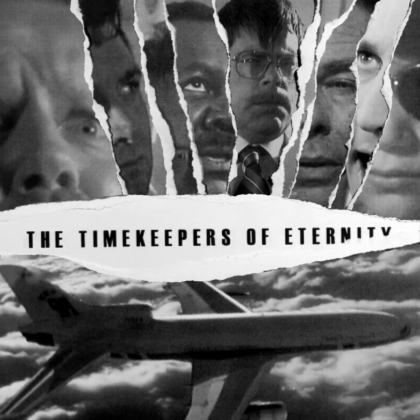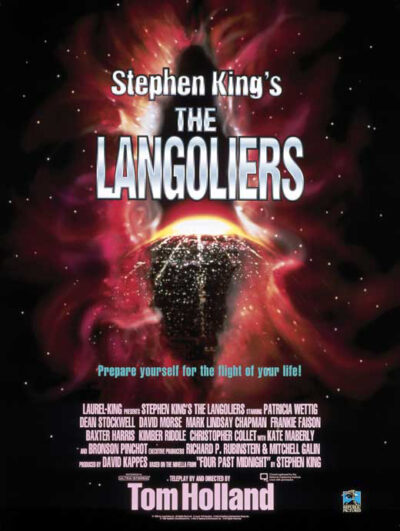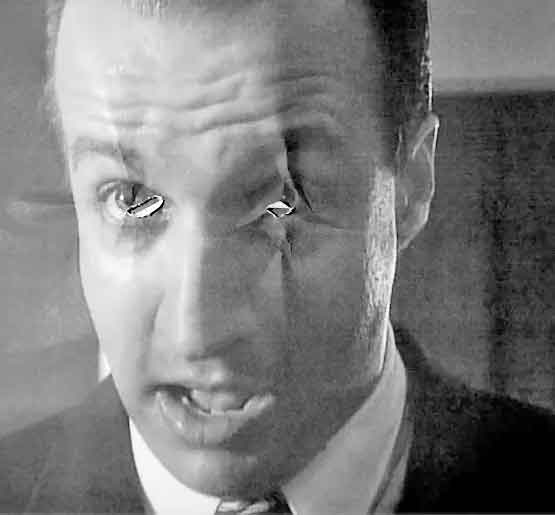 A new entry in the category of repurposed cinema, and a good one. This is a subgenre that includes Ann Mcguire’s STRAIN ANDROMEDA THE (1992), consisting of a reverse chronology reedit of THE ANDROMEDA STRAIN, and Peter Tscherkassky’s OUTER SPACE (1999), in which scenes from THE ENTITY were condensed into a nonlinear mood piece. The 63-minute TIMEKEEPERS OF ETERNITY (2021) takes the mid-nineties TV miniseries THE LANGOLIERS and, through judicious reediting and visual enhancement, creates an odd and unnerving depiction of otherworldly insanity.
A new entry in the category of repurposed cinema, and a good one. This is a subgenre that includes Ann Mcguire’s STRAIN ANDROMEDA THE (1992), consisting of a reverse chronology reedit of THE ANDROMEDA STRAIN, and Peter Tscherkassky’s OUTER SPACE (1999), in which scenes from THE ENTITY were condensed into a nonlinear mood piece. The 63-minute TIMEKEEPERS OF ETERNITY (2021) takes the mid-nineties TV miniseries THE LANGOLIERS and, through judicious reediting and visual enhancement, creates an odd and unnerving depiction of otherworldly insanity.
THE LANGOLIERS, written and directed by Tom Holland (of FRIGHT NIGHT and CHILD’S PLAY), was broadcast on ABC on May 4th and 5th of 1995. Adapted from a Stephen King novella (found in the 1990 collection FOUR PAST MIDNIGHT), it registered about medium-strength in the King TV movie firmament, with a gripping TWILIGHT ZONE-ish narrative offset by so-so performances by a slumming cast and poor nineties-era CGI.
Involved are several people, asleep on a cross country flight, who awaken to find that all the plane’s other inhabitants (including the pilots) have disappeared. This ragtag band includes Dinah (Kate Maberly), a blind girl with psychic powers; Brian (David Morse), an off-duty pilot; Nick (Mark Lindsay Chapman), a mystery writer; and Craig (Bronson Pinchot), a harried investment banker with a most demanding boss (S. King).
Nick uses his flying skills to land the Boston-bound plane in Bangor, Maine. The airport there is, like the plane, deserted, while an ominous sound Dinah compares to “rice crispies after you pour in the milk” is heard in the distance. Bob (Dean Stockwell), a mystery novelist, deduces that they’ve travelled back in time, with everyone else having moved forward and the moment they inhabited left to decay. Craig, whose frayed mental state is evinced by the sheets of paper he insists on methodically tearing into little strips, becomes convinced that the Langoliers, imaginary critters whose description terrified him as a child, are approaching, and Dinah doesn’t disagree.
In repurposing this program the Greek experimentalist Aristotelis Maragkos inverts its color values, rendering it in hazy black and white. This was done by laboriously reprinting each frame of THE LANGOLIERS, and then reediting it and adding animated special effects. The latter consist of animated rips, wrinkles and tears puncturing the imagery in a visual manifestation of Craig’s compulsive paper tearing (which may be intended as an indication that the entire thing is taking place in his disturbed mind, even though he’s offscreen a great deal). It’s not an entirely novel conception (the 2001 short film COPY SHOP utilizes similar torn paper animation and black and white photography), but it’s never been accomplished with more macabre finesse.
rendering it in hazy black and white. This was done by laboriously reprinting each frame of THE LANGOLIERS, and then reediting it and adding animated special effects. The latter consist of animated rips, wrinkles and tears puncturing the imagery in a visual manifestation of Craig’s compulsive paper tearing (which may be intended as an indication that the entire thing is taking place in his disturbed mind, even though he’s offscreen a great deal). It’s not an entirely novel conception (the 2001 short film COPY SHOP utilizes similar torn paper animation and black and white photography), but it’s never been accomplished with more macabre finesse.
I understand it was probably not Maragkos’ intent to improve upon the film he was deconstructing, but THE TIMEKEEPERS OF ETERNITY is in fact a vast improvement on THE LANGOLIERS. The black and white visuals are far preferable to the nineties-era high-definition photography of the miniseries, while Stephen King’s narrative benefits greatly from the condensation from three hours to one, with the series’ superfluous subplots and gratuitous romance expunged. Best of all, THE LANGOLIERS’ primitive CGI effects were blunted, if not replaced entirely, most notably in the depiction of the Langoliers, whose appearance severely marred the miniseries. Here those silly Pac-Man looking critters have been replaced by roiling monsters from the id that function as literalizations of the torn paper effects that dot the film, and make for a finale that all-but defines the term nightmarish.
Vital Statistics
THE TIMEKEEPERS OF ETERNITY
Director(s): Aristotelis Maragkos (and Tom Holland)
Producer(s): Aristotelis Maragkos (and David R. Kappes)
Screenplay: Aristotelis Maragkos (and Tom Holland)
(Based on a novella by Stephen King)
Cinematography: Aristotelis Maragkos (and Paul Maibaum)
Editing: Aristotelis Maragkos (and Ned Bastille)
Cast: Bronson Pinchot, Patricia Wettig, Kate Maberly, Mark Lindsay Chapman, David Morse, Frankie Faison, Christopher Collet, Dean Stockwell, Stephen King

